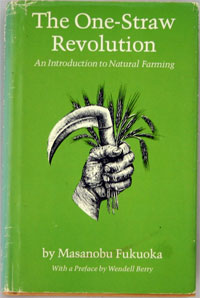
The One-Straw Revolution
 Masanobu
Fukuoka's The
One-Straw Revolution
is a hodepodge of advice for farming and living. To be completely
honest, I adored the first third of the book, but was annoyed by the
philosophical bent of the rest. Sure, I agree that we should
garden organically, eat locally, minimize our meat consumption, eat in
season, turn away from commercial farms and back to the small family
farm, reject growth economics, live simply, and work to live rather
than live to work. But those concepts are all old hat now.
Since I wasn't alive while he was writing the book, I don't really know
whether Fukuoka's ramblings were insightful and innovative at the time
or simply derivative.
Masanobu
Fukuoka's The
One-Straw Revolution
is a hodepodge of advice for farming and living. To be completely
honest, I adored the first third of the book, but was annoyed by the
philosophical bent of the rest. Sure, I agree that we should
garden organically, eat locally, minimize our meat consumption, eat in
season, turn away from commercial farms and back to the small family
farm, reject growth economics, live simply, and work to live rather
than live to work. But those concepts are all old hat now.
Since I wasn't alive while he was writing the book, I don't really know
whether Fukuoka's ramblings were insightful and innovative at the time
or simply derivative.
That said, the first
third of the book was rivetting. His farming
method (which I'll describe tomorrow) clearly paved the way for the
entire permaculture
movement. Fukuoka dubbed his technique "natural farming", and it
went far beyond simple organic gardening. He advocated working
with nature and mimicking natural processes, positing that many parts
of modern agriculture systems are only necessary because the farms are
out of balance and we're working against nature. As a result, he
also used the inspiring phrase "do-nothing farming", referring to the
aspects of modern agriculture that he did without.
Although there was still
a lot of work involved in Fukuoka's farm, his
do-nothing farming was unique. He promoted no-till techniques,
green manure, and mulching. You don't hear much about
Fukuoka nowadays, but I wonder whether he wasn't as influential in the
birth of the
permaculture movement as its self-styled father, Bill Mollison.
| This post is part of our One-Straw Revolution lunchtime series.
Read all of the entries: |
Want more in-depth information? Browse through our books.
Or explore more posts by date or by subject.
About us: Anna Hess and Mark Hamilton spent over a decade living self-sufficiently in the mountains of Virginia before moving north to start over from scratch in the foothills of Ohio. They've experimented with permaculture, no-till gardening, trailersteading, home-based microbusinesses and much more, writing about their adventures in both blogs and books.
Want to be notified when new comments are posted on this page? Click on the RSS button after you add a comment to subscribe to the comment feed, or simply check the box beside "email replies to me" while writing your comment.
